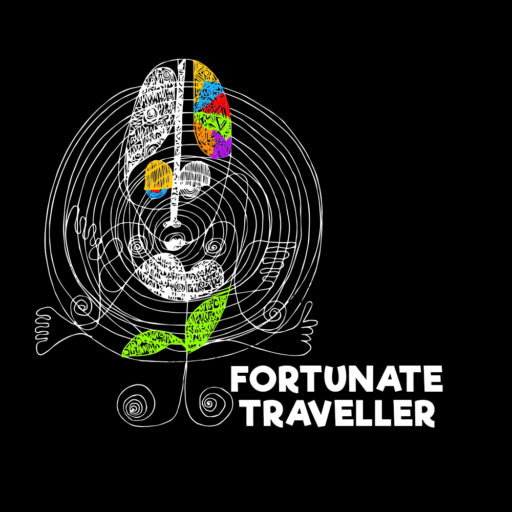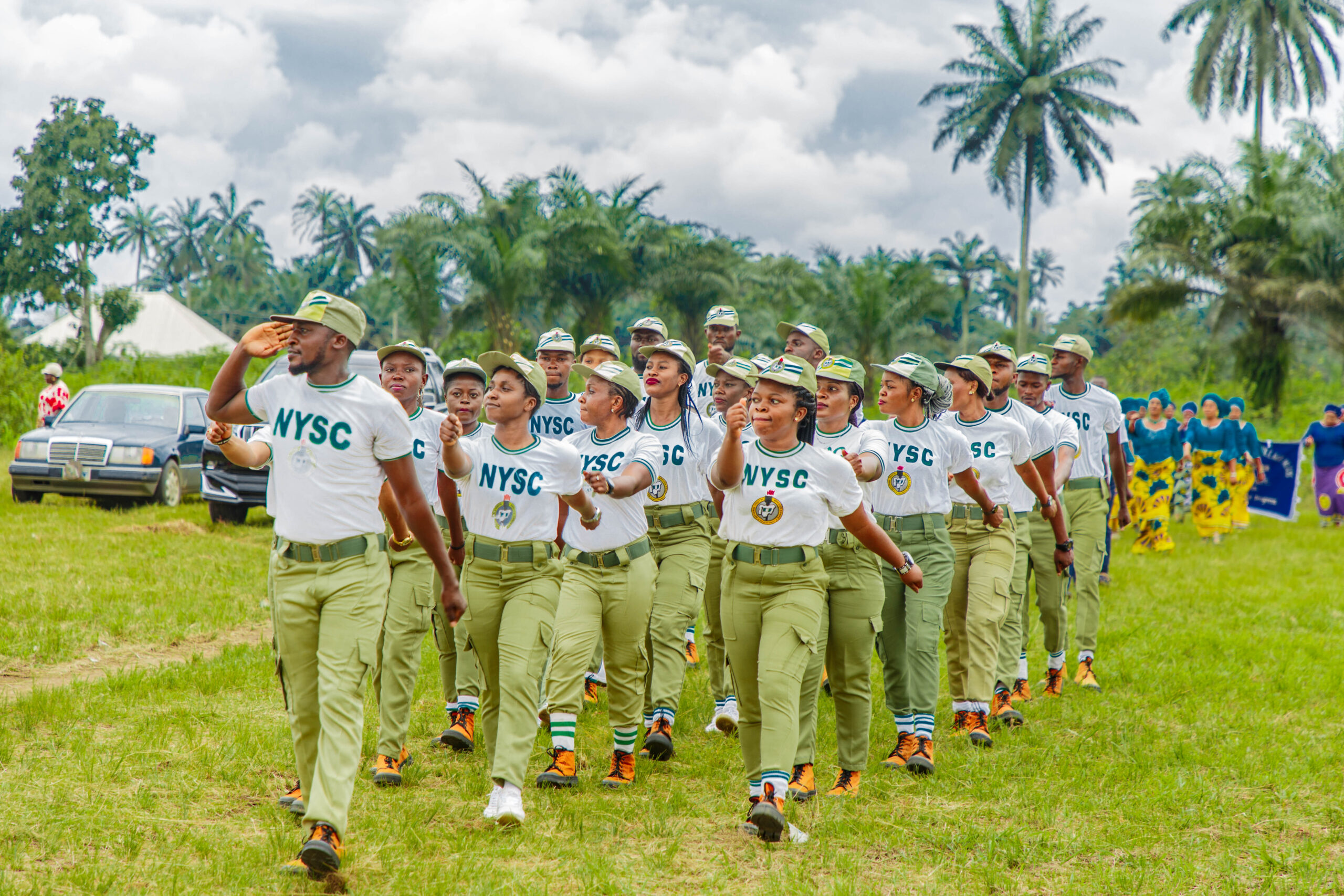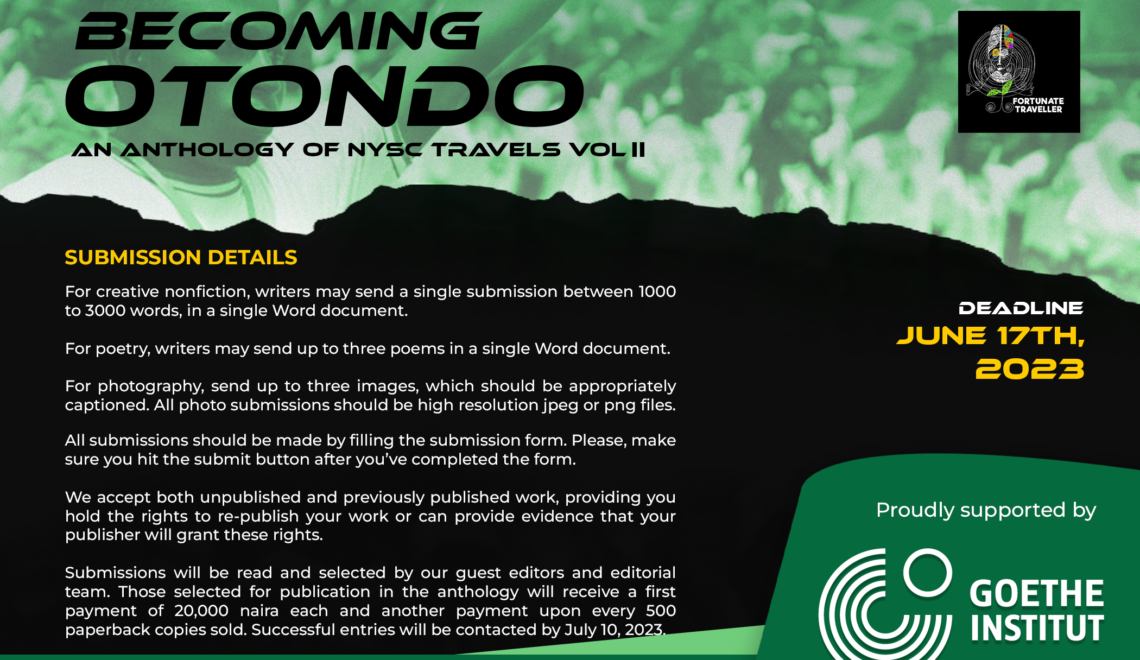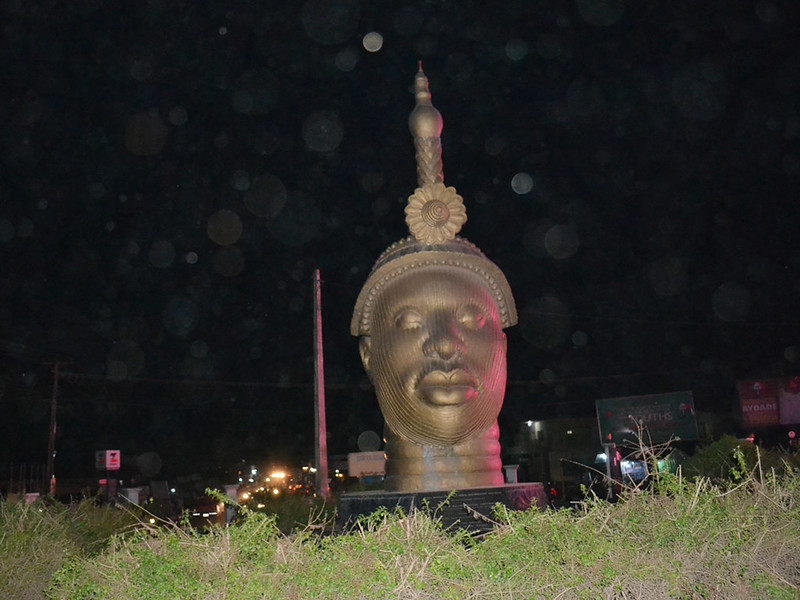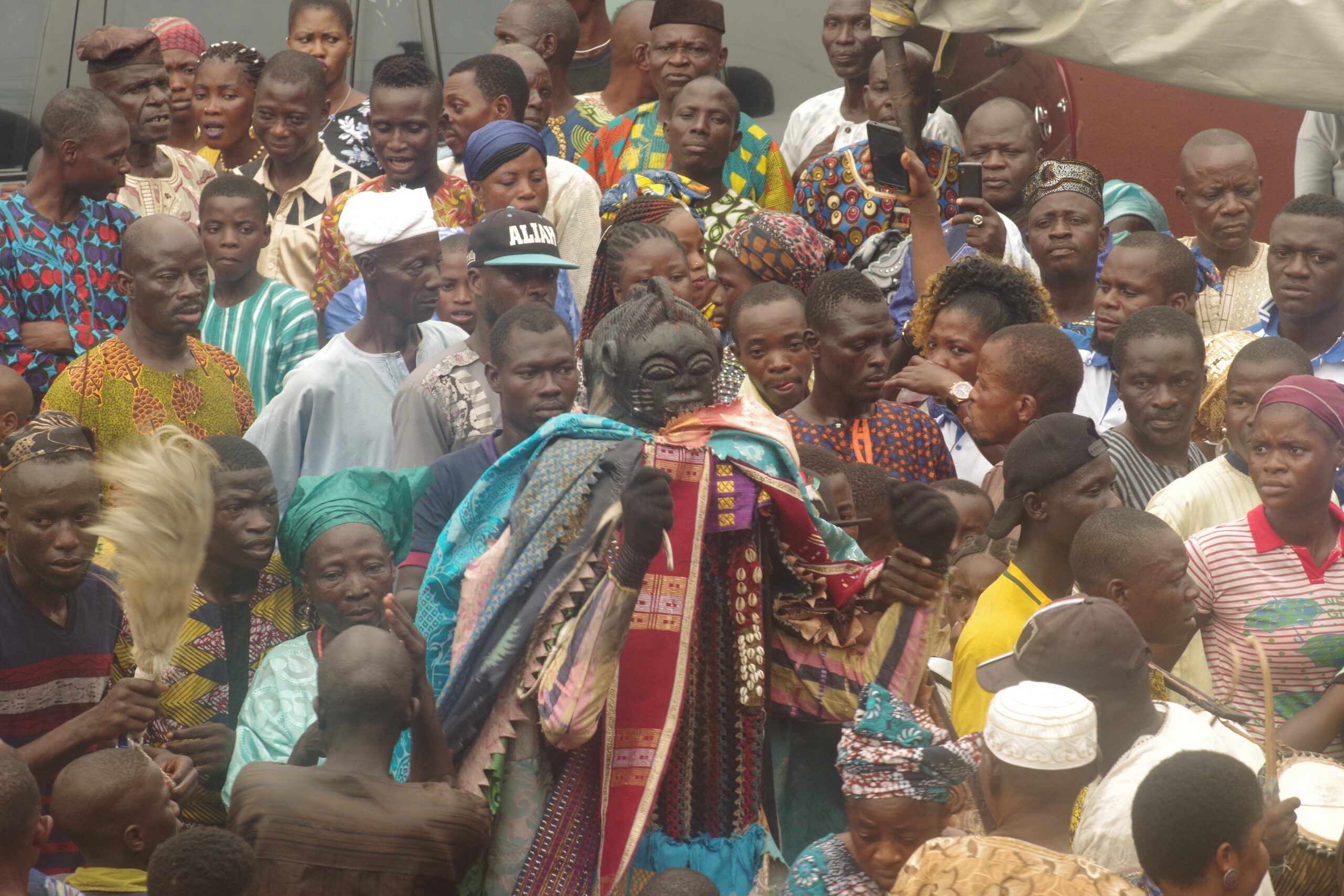
I: Morning
The world here is open spaces and quiet afternoons. But it is also slow misty mornings. I sit one Sunday charging my phone and waiting for a taxi going to Saki, the first stop on a journey to Ibadan, and I take to look at this place. It is early morning. There are noisy weaver birds in a mango tree just to my right. The ground that falls to the side of the road is eroded, the work of months of running water. A few children are about. There is a certain ease and contentment about them, an air of quiet confidence of people who know they are valued, who know they belong in this place. Where I sit, on a bench by a raffia shed, I watch children swing their feet from the edge of a wooden table as they engage one another in small chatter. A young girl with a tired gaze looks vaguely at something. Something about her illuminates a certain character to the morning. I can’t resist the urge; I take two photographs.
I look out, at the gnarled trees, at the riding clouds, at the market of small stalls. The market is relatively empty. The market days come every fourth day, and today is one; but market day or not the stall owners are never in any hurry to be out.
As the morning drags on, more people come out. The market begins to thicken with people. There is a swirl of traditional clothes. The women here wear headscarves and hijabs, their eyes lined with kohl, even the little girls. The men, and the little boys, often wear woven caps. Very few wear English clothes. In their style of dress, I see an easy blend of local tradition and Islam. Scattered among the market stalls and down the road are Fulani people, their women draped in colourful clothes and adorned with trinkets and bangles. They make up a sizable portion of the population here, the Fulani and their cows. They are indigene, I still hear my friend, Peace, say.
A few women greet me, and a child comes to me. He is shy, but trusting. We grow an instant friendliness. I play with his plump cheeks, and we speak Yoruba to each other. His is a lot better than mine, even though his words are barely formed, a boy not quite three. Speaking and making hand gestures, he asks that I lift him onto the table. I do, and soon he grows bored and asks, in Yoruba that I do not quite make out, that I should bring him down. Ehn, kí lo sọ? I ask repeatedly, and he keeps repeating himself, I not understanding and he getting frustrated. His mother, noticing from her shop, comes to our rescue, laughing. Aah corper yí ò gbọ́ ọmọ mi, she says. Ó ní pé òún fé sọ̀. He says he want to come down. I laugh and I sense the slightest heave of relief from the child. I carry him down and we continue to play, he at my knees, I tugging at his cheeks. As we talk, I learn he has a twin sister. I ask where she is, and he looks about for her, points where he thinks she has gone, slightly embarrassed that he doesn’t know where his sister is. Soon he is off, perhaps to look for his sister.
Just opposite me, a man wearing a white cap and a yellow-and-green tunic rises from where he was sitting on the edge of the road. He has a radio in his hand whose knob he had been turning. He advances unsteadily, his face contorted with anger. He begins to scream at some children playing, his voice straining and breaking. He makes angry, threatening gestures. He seems a disgruntled man. The children cease playing and stand still in fear. The man’s anger spends itself, and he returns to his perch, and the children return to their game.
II: Walking Into Experience Bare
A thrumming circle builds around the masquerade and its troupe of attendants. I join the crowd from behind, peer over a few shoulders, change my position twice to get a better view. I remember Achebe: To watch a masquerade dancing, you do not stand in one place—you dance with it. In coming and standing to watch, I have scruples, but I tell myself my motivations are artistic and anthropological. I fancy myself an observer and chronicler of life and ways, of people. So I watch. In the middle of the circle, a young man with bare arms walks up the tarmac to where a cock is thrown on the floor with its legs bound and picks it up. I do not hear the squawks of the bird for the noise, but I see that it is, in its terror and confusion, moving its beak, squawking. The boy with the bare arms is pumping with energy. His fellow attendants are caught in their ritual and their theatrics, mildly frenetic. The masquerade, a violent medley of palm leaves and colourful clothes stringed with small guards and charms, is leaping and swirling in a kind of dance. The boy walks back to the edge of the circle with the cock in his hand and whirls it in the air. The crowd shrieks and shrinks back, in a mixture of fright and excitement. But everything is playful and light, even fear, exaggerated to increase the fun and spectacle. It is all acting, and everyone is involved, the actors and the crowd.
My eyes fall on something—a black carved object, ugly, wreathed in fronds and red cloths, a deity. A pot is smoking at its feet. My eyes shift to the attendants: they seem caught up in a lot of movement, and there is mirth in their eyes; shift to the masquerade: it is still swirling in its mythic dance; shift to the crowd: they are still enraptured in excitement tinged with that heady trace of fear. Voices rise and fall all about in the crowd. Soon the masquerade and the attendants, accompanying in song, start to leave. The crowd makes a path for them, following behind as well, singing and dancing.
It feels like a grand theatrical production, replete with stage props and directions. I begin to think about art—theatre, music and dance. Art appropriates experience (and the things beyond experience), distills essence, enriches perception. It imbues reality, our mysteries and our contradictions with human significance. In delineating the human condition and enriching our experience so, it becomes its own reality.
Several hours after the masquerade, on a bus to Iseyin, I meet two men: a miner and a retired school principal (a fact I learn later. I take him at first to be a farmer and folk historian.) We drive through dusty roads and they tell me about the towns scattered about and about gold and precious stones. The miner points out the window and into the bush and says, Ofiki. We used to mine gold in this town. People used to come here from all over to buy gold or to do gold business. That time I can speak many languages, call anyone that I cannot speak—I hear them, many like that. And then he begins to count off languages on his fingers: Hausa, Yoruba, Igbo, Calabar, French. I even hear Arabic, small. I ask where he’s from and he says he’s from Ebonyi State. Igbo, he adds, as though to clear up any doubts. I had been confused about his tribe. He spoke with a distinct Igbo accent but had the look of a Yoruba from these parts, a dark earthy look, with yellow sunken eyes. More thoroughly it is beginning to dawn on me how wrong my first impressions of people’s tribes and occupations could be.
I have been here fifteen years, the miner goes on to say. I know all the roads, all the towns.
As he says this, he points out at roads snaking through the bushes—roads I can scarcely see sometimes—and tells me what towns they lead to. I remember the names of some of the towns he discussed or pointed to as we drove through: Ofiki, Oyo, Iseyin, Saki, Sepeteri, Igboho Kishi, Ofa, Agbonle, Oje.
I ask about these towns and the people in them. I ask what they are known for, ask about their history, and both men begin to tell me. Most are farmers, they say, some are hunters, some weavers. Many of the women trade, often in addition to minding small farms of their own. Some communities are known for mining and others for fishing. They then tell me about the history of the towns and the people. They talk about who settled where and about the small disputes the townspeople have had over the years. The old school principal is the higher authority in these matters. He corrects the miner when he is getting a fact or two wrong, and the miner argues, hating to be called wrong on a subject over which he felt he was an authority as well. Finally, however, he defers to the older man and quietly updates his own version of things.
Listening to the two men, I realize there is so much I will never know. I am walking into experience bare, and I doubt I’d ever come out fully clothed.
III: Ilé Blue tó wà lọ́ọ̀hún yẹn, The Blue House down there
The afternoon is a quiet afternoon when I arrive in Ogbooro, a small town in Oyo State. That is the truest way to put it: quiet and forlorn. There are no people in sight, no motorcycles or trucks going up the road—the taxi that had brought me had driven on, and I stood waiting under a tree looking about, wondering what sort of place I had been sent to. I surely must die of boredom, I thought to myself; do people even live here, like people who come out often and go about the daily affairs of living? I move up to an empty shop and place my bags down on the half walls that jut out of its sides, what I sometimes call the arms of a shop. I look about me, and for an instant tthe whole place seems white, the white sand, the unpainted shop, the dusty air, the afternoon sun, the glistening road. While I stand there waiting, I see a woman peek out of another shop just a few steps away. She is wearing a white hijab, a baby cradled with one hand to her abdomen.
Ẹkáàsán, I greet.
Ẹkáàsán, she answers back, ta lẹ̀ n wá? Who are you looking for?
Corper ni mí. Wán post mi sí bí.
Aah corper, e kábọ̀. You’re welcome.
Sé dáadáa ni? She asks if things were well.
Dáadáa ni. They were well, I answer, feeling relief on having found somebody.
Ẹ wo bè yẹn. Ibè ni àwọn corpers n gbé, Ilé blue tó wà lọ́ọ̀hún yẹn, she says, the blue house down there. And she points at a house—a small blue house—some distance away.
I raise my hand and wave a grateful goodbye and begin on the sandy lane to the house. There are a few cattle grazing in the fields, sheep and goats resting in the path and in wooden sheds, lots of trees and open spaces, and in the air a citrusy scent. Maybe it may not be so bad after all, I imagine, maybe I may come to love this tranquil pastoral place.
I reach the house and it is as if no one stays there. Sunlight falls in thin shafts across the dark floor, from crevices around the doors, from windows hidden away, from the front door I had opened a crack. I open the door fully and step in. Light pours in. There are blue walls and brown doors and a fairly large space in the middle, and in front of every door are dwarf walls, regularly spaced, on which are piled plates and cups and bowls. On the dwarf walls further away, close to the bathrooms, are buckets, several of them, asserting, in their own way, a kind of claim to the space. By every door stands a gas cylinder. With more imagination one could take them for sentry men, smart and at attention in their bright-coloured jackets. Everything bore the marks of life temporarily lived, the place only a makeshift stopover on the journey to better things. A typical student lodge.
Hello, I call.
People came out: a young man, Jimmy, with a curious look on his face and a small smile; a lady in a shimmy with her hair in a net, who greets in a cherry voice, U.D.; a smallish lady, Peace, who says, You are welcome to our amicable lodge. That’s the name of our lodge, Amicable Lodge; and then a dark-skinned young man, Bello, with music playing from a small Bluetooth device in a bag strapped behind him. This young man asks me many questions, questions that I find odd, not so much for the questions themselves as for their timing and his manner of asking, with a tone of interrogation. I give sketchy answers to his questions with a scowl on my face, hoping he’d see that I found his manner rude, and his questions uncomfortable. But he doesn’t get the hint—or he does and chooses to ignore it—and he presses on with his questions. I push past him and talk with the other people around me. I ask questions about who I needed to see and what official things I needed to do now that I had finally reported for youth service. I ask also about the lodge, and about the people and the place in general. I am assured everything is fine. Rachael, a tall girl who comes out of her room later, is the one who answers my questions. She helps also as I go about the necessary official things. I soon settle properly, and I feel grateful.
As we sit outside, done with asking my questions or answering any important ones, I look out at the surroundings. Just beyond is the school that would become my place of primary assignment; the lodge is behind the school, connected to it by a path through the grass. The school is several squat blocks overlooking a playing field, and at short distances behind it are clusters of trees—cashew trees mostly—growing in a ring, their branches close to the ground. Some morning soon, I would go around, I tell myself, and I return my thoughts to the blue house, which doesn’t seem so blue anymore.
^This is an extract from Fortunate Traveller publication, Government Pikin: An Anthology of NYSC Travels Vol I edited by SA Sanusi and Sami Tunji. Other extracts from the anthology will be published in the coming weeks. Meanwhile, the submissions call for the second volume is currently open through June 2023. You may submit by completing this form.
Joseph Omoh Ndukwu is a writer and editor. His work has appeared in Guernica, the Prairie Schooner, A Long House, Off Assignment, Lolwe, and elsewhere. His essays have also appeared in Rele Gallery’s book of young contemporary artists, New Directions, and in the anthology Government Pikin published by Fortunate Traveller. In 2017, his essay was nominated for the CIAPS Public Interest Essay Prize, and in 2021 he was selected for the emerging critics residency with Momus, an international journal of art writing and criticism. He lives in Lagos, Nigeria. He tweets @Joseph_Omoh_.
Cover photo credit: Depo Olukotun
